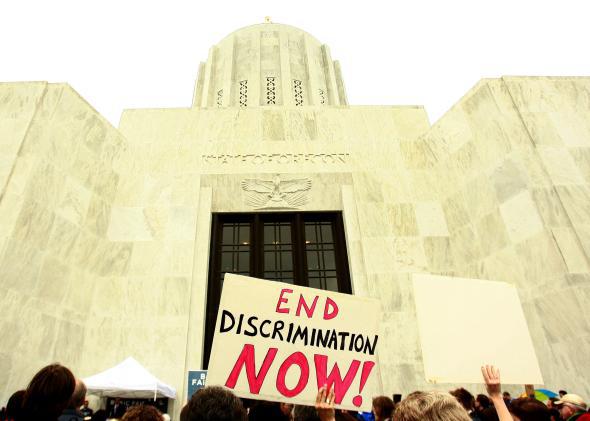In November, Oregonians will vote on (and probably pass) a constitutional amendment allowing gay marriage in the state. Just down the ballot, another initiative will likely appear, giving business owners a “right of conscience” to refuse gay people service. As worded, the referendum will present itself as a modest caveat to the gay marriage law, extending a few basic safeguards for religious freedom. In reality, this ugly, mean-spirited initiative will herald nothing less than a new era of anti-gay segregation in Oregon—and, potentially, all across America.
The notion of legally enshrining bigotry under the banner of “religious freedom” is, of course, nothing new. For decades, private organizations argued that they had a First Amendment right to discriminate against black people based on racist readings of the Bible, even after the 1964 Civil Rights Act proscribed such discrimination with no religious exemptions for private citizens. The Supreme Court slapped down these perverse claims in 1983, and since then, arguments for the religious liberty of private companies to discriminate against blacks have become keenly impolitic.
Prejudice, however, is enduringly protean, and over the last few years, bigots have deftly repackaged this seemingly dead-letter strategy as a principled defense against gay rights. The tactic is a brilliant one. Gay marriage on its own is a winning issue because it has no victims, only cheerful, loving advocates. But toss religious liberty into the mix, and suddenly you’ve found your victims: those earnest, upstanding small-business owners who just want to do the Lord’s work by denying a gay couple a wedding cake.
It’s easy to tell gay couples who face such discrimination to just take their business elsewhere, as former Obama speechwriter Jon Lovett did recently. But that ignores the two broader problems of the “religious liberty” defense. The first is a purely legal one: There is simply no constitutional right for a private business to discriminate against gays. In a landmark case, the Supreme Court ruled that an individual can’t invoke his religious beliefs to dodge an otherwise valid law. Writing for the court, Justice Antonin Scalia scoffed at the notion of “a private right to ignore generally applicable laws”—think basic anti-discrimination ordinances—labeling the idea “a constitutional anomaly.” And in a now-famous passage, the justice noted that “conscientious scruples have not … relieved the individual from obedience to a general law not aimed at the promotion or restriction of religious beliefs.” Hatred of gay people is surely a “conscientious scruple” that Scalia himself shares. But it doesn’t excuse a private citizen at a private business from following fundamental anti-discrimination laws.
So much for the constitutional problem. Yet the second problem with the religious liberty rationale, the practical objection, is less easily dispensed with. It’s tempting to shrug, as Lovett did, at bigoted business owners who don’t really deserve gay people’s money or business anyway. And I myself would certainly never shop at Sweet Cakes. But in the realm of social equality, apathy is a form of moral abdication—one with deeply chilling consequences. Initiatives like Oregon’s could easily be extended to apply to any business, so long as the owner declares her personal religious hostility to gay people. What began with bakers and caterers has already stretched to clothing stores and florists; inevitably, it will soon stretch to restaurants, hotels, movie theaters—in short, to all facets of public life. A religious right to discriminate against gay people will lead directly to anti-gay segregation. Business owners whose “conscientious scruples” mandate homophobia might as well start putting out signs alerting gay people that their business isn’t welcome.
That’s not, I suspect, a reality that most Oregonians (or Americans) want to experience. But it is, without a doubt, the direction the country is moving—and Oregon’s “religious liberty” initiative will only expedite the process. Don’t be fooled by bigoted bakers’ sincere defense of their Christian principles, or by politicians’ pleas for freedom of conscience. The religious defense of discrimination is based not in morality, but in hatred and intolerance. And we shouldn’t condone their vision of an America segregated by sexual orientation.
